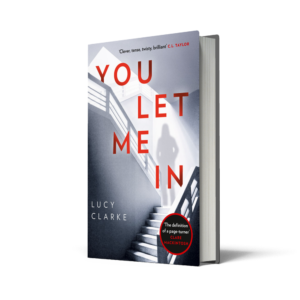Six years ago I was working for my local council trying to attract more shoppers to an ailing town centre. I didn’t know what I wanted to do with my life, but it wasn’t that. At the time I heard about a friend of a friend who was looking for feedback on her unpublished novel manuscript. I’d always harboured dreams of being a writer one day, so I volunteered to take a look.
The manuscript was the work of a young woman named Lucy Clarke. She agreed to show me the manuscript, and probably didn’t expect to get much out of it. I then turned in around fifteen pages of notes and enthusiastic suggestions. I don’t know if she was just being polite when she told me they were extremely helpful. But it was her parting words that stuck with me:
‘If you’re that interested, why aren’t you writing novels?’
That manuscript never got published, but Lucy’s next one did, and it became a bestselling hit – a Richard and Judy Summer read. It was translated into 12 languages and sold tens of thousands of copies around the world. She went on to follow that up with a second, brilliant book, then a third, and a fourth.
Her fifth and latest novel – a psychological thriller called You Let Me In – was published by HarperCollins earlier this month. It jumped straight into the top ten on the UK Amazon charts, and reached number one in the UK iBooks charts. And if you’re in the UK you can get it this week for just 0.99p (It’s an Amazon UK deal of the month – but only here in the UK)
It took me a little while to follow Lucy’s advice. But eventually I did, and I’m now about to release my fourth novel The Girl on the Burning Boat. Which means that, in one sense, we’ve sort of ended up in the same place. Except we haven’t really. You see, apart from the obvious – she’s much more successful than I am – we’ve also taken very different routes. Lucy is 100% traditionally published, with an agent, a ‘top five’ publisher and everything that goes along with it. While I’m entirely self-published. So I thought it would be interesting to sit down with her and find out some of the differences in the two approaches in the modern, mixed up world of 2018…
How do you publish your books, and why did you take that decision?
Gregg: I self-publish all my books. When I finished writing my first novel, in 2016, there were already lots of reports of self-published authors finding it easier to make a living than traditionally published authors. On top of that there have always been these reports of big-name authors spending years being rejected before finally landing a deal. I assumed that the same would happen to me – as a best-case scenario. The worst case was I’d never get a deal. And I didn’t really have the time to wait. I’d left my job to write while I was looking after our pre-school children. Our arrangement was that, once they started school I either had to be making a living from writing, or I’d need to get another job. So it felt like my choice was between a very unlikely shot at not really making a living (trad publishing) or a chance at making a living (indie-publishing).
Lucy: When I first started writing in my mid-twenties, self-publishing wasn’t such a big opportunity. eBooks still had a tiny proportion of market-share, so traditional publishing was very much the obvious path. It took me five years of writing and rejections to secure my first book deal with HarperCollins – but receiving that phone call from my agent, ‘Lucy, we’ve had an offer from a publisher,’ goes down as one of the most exciting moments of my life.
Are you happy with your choice?
Gregg: I’m happy with how it’s going now. My aim is that the books I put out are identical in quality to those released by a major publisher. But actually that’s almost impossible to do. There’s a reason publishers have so many editors, cover designers, marketing experts and so on. And to try and replicate all that is hard. I feel like my third book (The Things you find in Rockpools) was the first to get even close to meeting that standard. And there have certainly been times when I wished I had a team of people behind me – especially an editor to put me back on the right track. The plus side of not having a publishing team behind you, is that you get to keep a much greater share of any royalties. Which means I have managed to meet my deal of earning a living wage by the time the kids are in school.
Lucy: Absolutely. I’m fortunate to work with a brilliant and experienced team at HarperCollins. My editor is smart and insightful, and her input into each of my novels has been invaluable. In addition to that, HarperCollins have a fantastic sales team that pitch my book for the all-important supermarket and retail slots. I also work very closely with a publicist and the marketing team, who take care of press, advertising, and digital. When I see how much work goes into bringing a book to life, I completely take my hat off to Gregg and other self-published authors.
What would you do today if you had to decide between self or traditional publishing?
Gregg: Indie all the way.
Lucy: Traditional all the way 😉
How do you write your books? At what point does the publisher become involved? Do you have to give them a clear outline or just an idea?
Gregg: Since I don’t have a publisher, I’ve kept my ideas to myself until quite late in the process. My first books weren’t planned at all. In fact in hindsight it feels like I just wrote myself into a corner, and then had to figure out a way out of it. I felt the structure was a bit sketchy as a result, so I plotted Rockpools out in advance. I made a complicated flow chart and pinned it to my wall. It doesn’t mean I stuck to it exactly, but at least it was there, like a map in case I got lost.
Lucy: When I was trying to secure my first book deal, my agent submitted my finished manuscript to interested publishers. Now that I’m a little further along – and have worked with the same editor from the beginning – I’m able to verbally share a concept (often no more than a few sentences), and together we’ll discuss the merits and drawbacks and go from there. Once I have the idea in place, I typically spend the next couple of months brainstorming plot lines, the structure, and character biographies. Once I feel like I know my characters and what makes them tick, then the writing begins.
How long does it take? How many drafts do you go through?
Gregg: It’s got shorter with each book, but I’d say the first draft takes three or four months, and then I do three or four drafts after that. The later ones get pretty painful!
Lucy: My novels take between 12-18 months to write. I do numerous drafts – sometimes as many as a dozen. My editor usually sees the novel five or six times during this process and provides feedback. Traditional publishers love it if authors can produce the golden ‘book a year’.
We’ve both travelled a lot, and both our books involve quite exotic settings. How important is travel to what you do?
Lucy: My husband and I are both self-employed, so we spent a lot of our twenties and early thirties travelling and taking our ‘mobile offices’ with us. We now have two young children, so our travels have taken on quite a different flavour. My first three novels were set in exotic locations, and I’m a great believer in ‘being there’ in order to write about a place with credibility. Whenever we’re away, I make reams of notes in a journal, which helps me to bring the setting to life when I’m back home at my desk in the UK.
We also both have young children, how easy it is to combine writing and looking after them?
Gregg: For me the hardest thing to get my head around was how quickly the situation changes. When I began I had a three year old and nine month old baby to look after – and they both napped – so I got myself into a nice routine where I would write while they napped. And then they stopped napping, so I had to change.
Lucy: My husband and I co-parent, so I write Monday to Friday from 7.30AM-12.30PM. Then we swap, and my husband goes to work for the rest of the day. For me it’s a lovely balance; I’m definitely a morning person, so I squeeze all I can from my brain in those early hours, and then after that it’s hang-time with the kids.
What advice would you give to anyone wanting to follow in your footsteps?
Gregg: If you’re looking to self-publish, then it’s all about treating the process like a business. Your books are the products you’re selling – so they have to be, and look, as good as you can possibly make them. That takes work and money – you need to invest in covers, editors, website designers… You also need to accept that you’ll probably need several books before you’ll recoup that investment. So you’re playing a long game – but that’s OK because you wanted to be a writer, right? You’re going to have to do a lot of writing!
Lucy: If you’re hoping to become traditionally published, I’d recommend finding a good literary agent. It can be a long, hard process – but keep persevering. Almost all published writers I know have waded through a sea of rejections before finally getting their break. So keep going – you’ll get there.
Thanks Lucy for taking the time to sit down. I’ve just checked and Lucy’s new book is currently at number 3 in the UK Amazon charts – let’s give her a push to get to number one!
Lucy’s new book You Let Me In is available on all platforms from the links below:
Amazon UK (Buy it! It’s deal of the month. What are you waiting for!?)
Amazon US
Ibooks
Kobo
You can follow Lucy on Instagram (@lucyclarkebooks) or Facebook (www.facebook.com/lucyclarkeauthor)




Recent Comments